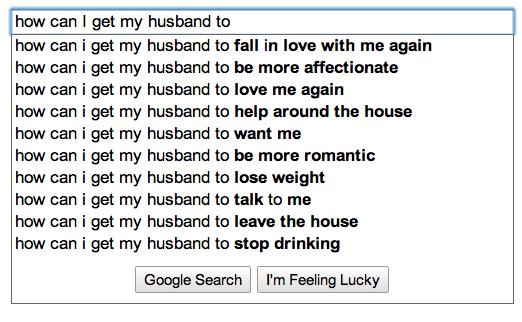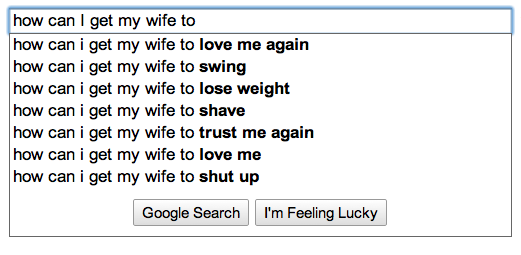Mine — A short story
Inspired by Valentine’s Day “Mine” is a short story by sportswriter Patrick Dorsey about the steps that lead, or don’t lead, to a new relationship. Featured in this story are the Behavioral Economic principles of virtual ownership and the self-fulfilling prophesy.
.
What Husbands and Wives Search for on Google
A few days ago we looked at some telling search suggestions by Google when it came to what boyfriends and girlfriends searched for in their relationships. On the heels of this insight, I wanted to see what changes when we get older and get married…:

 What we find, both sides seem to care more about love, but in general the it seems that not much has changed since the days of dating for married couples. According to Google, these gender differences that we found earlier tend to persist…
What we find, both sides seem to care more about love, but in general the it seems that not much has changed since the days of dating for married couples. According to Google, these gender differences that we found earlier tend to persist…
For a very elegant tool that lets you play with such searches, see: http://hint.fm/seer/
What boyfriends and girlfriends search for on Google
You know how Google sometimes “predicts” what you might be searching for by giving you a little drop down menu of suggested search queries? These suggestions, of course, are based on what other users frequently search. So I tried teasing out some gender differences. Look at the pictures below.
This shows Google’s remarkable power as a source of data on a range of human behaviors, emotions, and opinions. It gives us insights into what people might care the most about concerning a given topic. When people search a particular political leader, what are their main concerns? What are people secretly guilty about? For better or for worse, Google’s obsession with collecting and refining data has given us a window into each other’s fascinating and telling curiosities.
Dear Irrational (Does it Pay to Play Hard to Get?)
Dear Irrational,
I recently met a great guy – let’s call him George – and now I can’t stop thinking about him. Though we’ve only been on a couple dinner dates, he’s officially won me over.
Now here’s my problem: Smitten as I am, I’m ready to hop into bed with George this very minute, but I’m not sure that’s the best idea. After all, there must be some reason that all those books and magazines (not to mention my mother) champion the make-him-wait rule. But does it really work? I’ve never followed it in the past, but then, I can’t say I have the best dating track record either.
What do you think? Should I play hard to get, or no? Help!
Sincerely,
Unsure
——
Dear Unsure,
Your mother is right: making the guy sweat a little (no, not like that) is in your best interest if you want to maximize the chances f a long term relationship. The reason lies in cognitive dissonance, which refers to what we do when our beliefs and actions misalign: Can’t change the cold, hard facts? Then change your beliefs!
The classic experiment here comes from psychologists Leon Festinger and James Carlsmith, who had participants perform a boring task and then paid them either $20 or $1 to convince someone else that the task had been great fun. Everyone then rated the task, with the result that the $1 participants rated the task more positively than did the $20 crew. While the $20 group could explain away the dissonance between their action (“I told someone the task was riveting”) and their belief (“It actually bored me to tears”) via money (“I was paid to promote the task”), the $1 individuals could not because they could not justify misleading others for such a small amount of money– so they changed their initial belief (“I must really like the task, to have promoted it”) and they ended up rating the task more positively.
To give you an example that is closer to our social life, look at fraternities: loyalty to frats increases with the amount of hazing, since pledges tell themselves, “I did a lot of embarrassing stuff for my frat – it must really matter to me.”
So, going back to your dilemma, Unsure, cognitive dissonance suggests that if you really want a guy, you have to create a dissonance for him, so that he will say, “Wow, if I put in all this effort for the woman – I must love her.”
This means that instead of putting out early, you have George pursue you. Instead of splitting the check, you let him pick up the entire tab. Instead of calling him up and suggesting dates, you leave the calling and planning up to him. In other words, make him work, and he will rationalize it by deciding he loves you.
Good luck.
Irrationally yours,
Dan
p.s please don’t tell George about my advice, and who gave it to you
PREDICTABLY IRRATIONAL SHORT STORY SERIES NO. 3
It’s time for another Predictably Irrational Short Story! This one is a love story the beautifully demonstrates some of the principles of discussed in Predictably Irrational about decision making applied to dating, again written by one of my students at Duke. It’s called “The Dating Game” and you can find it here.
A joke from my father (don’t blame me)
A 70-year-old, extremely wealthy widower, shows up at the Country Club with a beautiful and very sexy 25 year-old blond who knocks everyone’s socks off and who hangs over Bob’s arm and listens intently to his every word.
His buddies at the club are all aghast. At the very first chance, they corner him and ask, “Bob, how’d you get the trophy girlfriend?” Bob replies, “Girlfriend? She’s my wife!” They’re knocked over, but continue to ask, “So, how’d you persuade her to marry you?”
“I lied about my age,” Bob replies, “I told her I was 90!!”
Also see this:
Valentine’s Blog
Given Valentine’s Day and the state of the market, let’s consider which approach to finding love is better: 1) the free market system where everyone can find their own date and figure out who and what is best for themselves; or 2) a regulated market where your parents, family, or perhaps some kind of matchmaker have a say. This may be an impractical question these days (how many people let their mothers set them up?), but this is still a complex problem that’s been discussed for millennia, without any apparent solution. But here’s a boon for anyone who is starting to lose hope of finding love: a study that shows the importance of commitment to happiness.
The world of dating has grown increasingly complex, we have online dating, speed dating, casual dating, traditional dating (I think it’s still around anyway), and so on. The problem is, that with so many options, commitment to a relationship becomes difficult—you never know if there’s someone more perfect for you just around the corner. In a world where switching partners is difficult, people are likely to hang on and attempt to work things out. But in a world where it’s easy, or seems easy, to switch partners, people are likely to give up when things first go wrong. And yet, the ever-present temptation that there is someone out there who is better can be incredibly devastating to our personal happiness.
So we have to wonder then, how important is commitment? Dan Gilbert and Jane Ebert conducted a study with this question in mind using photography. In their experiment, they gave students a short course in taking black and white photos and taught them how to develop their pictures in the darkroom. Half the people were told that they could pick one of their pictures to be professionally enlarged and developed, which they could then keep. The other half were told to pick two pictures to keep, and that they could change their minds until the minute that the film was sent off. These people had a continual temptation to change their choices, so they had time to consider and reconsider which of their prints were the best.
Later, each participant was asked to rate their level of happiness with their prints. Guess who was happier, those who chose a photo and stuck with it, or those who had flexibility and time to make the perfect selection? As it turned out, the people who could alter their choices were much less happy than the first group. The principle behind this is that when we have to deal with a certain reality, we get used to it and often come to prefer it. But if we think we can change it, we don’t force ourselves to cope, so inevitable imperfections—whether in people or in pictures—can drive us to distraction. And the same thing happens with marriage. If we think of marriage as an open market and always have half an eye on other options, we’ll be less likely to be happy.
 Tweet
Tweet  Like
Like 
